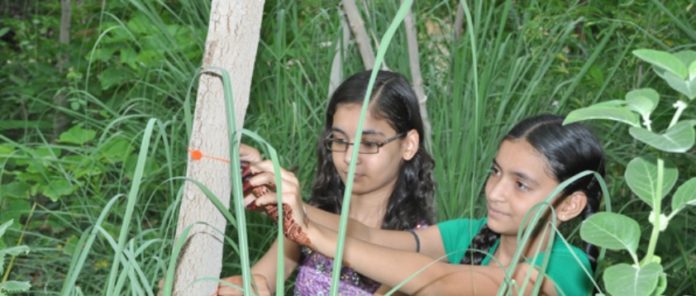
This is a heart-warming and inspiring story of young and old inhabitants of Piplantri Village, in India’s Rajasthan state, who have set an example for the country as well the world to emulate. India’s sex ratio is out of whack (as per the Census of 2011, it is 940 females to every 1000 males) and the birth of a female is rarely celebrated in this part of the planet.
In a country where a female baby is often killed inside the womb, this village stands apart – people here not only embrace their daughters but have created a revolution of sorts by making a conscious effort to save female children, as well as the green cover, by planting 111 trees every time a girl is born.
One girl child equals 111 fruit trees. Well done, Piplantri village in Rajasthan. http://t.co/wtZ4Yr61cy
— Rose George (@rosegeorge3) April 6, 2015
Kudos to Piplantri in Rajasthan; small village with big ideas!! http://t.co/UfFLr0nP66
— rupal d (@oops_rups) April 5, 2015
http://t.co/f8JYRoD1w7 the Piplantri village in India is a beautiful inspiration. #ecofeminism #feminism
— Hayley B. (@hayleywpg) March 30, 2015
This is so heartwarming Daughters are cherished in Indian Village Piplantri & Breaking Down Gender Barriers http://t.co/z9hlqTNSAp
— { Vanna Golightly } (@vannadear) March 30, 2015
A village in India seeks to give its girls – and environment – the best chances possible. http://t.co/3RO95ypTRd #susocialwork
— R Pingitore (@rpingitore1) March 30, 2015
To ensure financial security, village residents collect INR 21,000 between themselves and INR 10,000 from the female child’s parents. The total is deposited in a bank for a period of 20 years to help the girl when she is grown up. To make sure that girl receives proper education, the villagers make the parents sign an affidavit, which also restricts them from marrying her off before she attains the legal age for marriage.
The community ensures that the trees survive, attaining fruition as the girl grows up. To protect the trees from termites, the residents have planted 2.5 million aloe vera plants around them. These trees, and the aloe vera plants, are now a source of livelihood for many residents. Apart from selling the fruits, the community now produces and markets aloe-based products like juice and gel, among other things.
In the past 8 years, a quarter of a million trees have been planted. The village is covered with Neem, Mango, Amla and Sheesham trees leading to a higher water level. The village leader has completely banned alcohol, open grazing of animals and cutting of trees. Villagers claim there has not been any police case here for the last 7-8 years.
You want to support Anonymous Independent & Investigative News? Please follow us on Twitter: Follow @AnonymousNewsHQ











